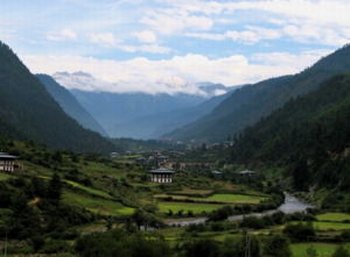Beyond the Sky and the Earth: A Journey into Bhutan by Jamie Zeppa (Riverhead Books)
In a world where few corners contain a road less traveled, Bhutan is still not a key destination on the backpacker trail. It is famous for its beauty and its spot on the happiness index, which is just another way of evoking Shangri-La.
When Jamie Zeppa went there as a volunteer English teacher, she detested the place. A chicken effortlessly demolished her high-tech flashlight, the gas stove terrified her, and the children she taught all seemed to have the same name. She lived on cookies and counted the days before she could escape back home to Canada, but her small students had other ideas. Taking her in hand, they brought her fresh food, taught her to use a pressure cooker, and helped her learn to love the village life. Then she was transferred.
In a university setting, Jamie has all the comforts she has learned to live without, from a garden apartment to sliced bread. Her students are all fluent in English and fall into her own age-group. As she helps them discover the intricacies of Macbeth, they give her inklings into the political disruptions that lurk beneath the idyllic surface of the country she has learned to love.
People from the north of Bhutan mistrust the southern Bhutanese, many of whom have roots in Nepal and carry that culture with them. Differences in dress become deadly divisions for some, with Bhutan's "national dress" becoming a symbol of the country's culture and traditions. In Bhutan, Jamie learns, there is "not a dress code but a dress law." And speaking the Nepali language is considered a act of sedition.
Terrified of having its culture and language over-run by people from another country, Bhutan tightens its restrictions and what was a rift becomes a Situation. There is talk of separatism and some of Jamie's students leave the university to fight the "anti-nationals." There are rumors of torture and students who were imprisoned for treasonous acts return to class, "looking years older."
"This is not about democracy or human rights, I think...I have not heard one person speak of mediation or negotiation or even the listening that is necessary for understanding. There is no recognition of any overlap, any common ground...it is a case of two solitudes."
"I love the view," Jamie observes, "but I would not want the life." And then she falls in love, with a man who speaks Nepali when he talks in his sleep, and the life she is reluctant to take becomes in some way hers forever.
This is a love story, but not one between two people. It is a common theme of how a Western woman falls in love with an Eastern country--yet there is nothing common about the thoughts and perceptions and images that Jamie Zeppa brings to this. Her book is one that illuminates on many levels--spiritual, political, cross-cultural.
When she takes the refuge vows that show her commitment to following the path of Buddhism, Jamie realizes, "The practice is the practice...For the rest of my life." Her book plainly reveals how that practice has enhanced her life in Bhutan, in Canada, with the man she loves or without. Reading her words will burnish the perspective of any woman who has fallen in love with an Asian country--or yearns for the chance to do this.
